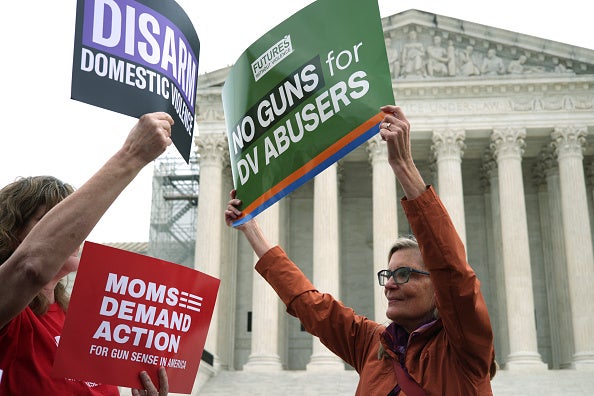
Sign up for the daily Inside Washington email for exclusive US coverage and analysis sent to your inbox
Get our free Inside Washington email
The Supreme Court has upheld a law designed to keep firearms out of the hands of domestic abusers.
The court’s 8-1 ruling in United States v Rahimi on Friday holds that “when an individual has been found by a court to pose a credible threat to the physical safety of another, that individual may be temporarily disarmed consistent with the Second Amendment.”
Only conservative Justice Clarence Thomas dissented.
Zackey Rahimi pleaded guilty to violating a law that required him to relinquish his firearm because he had been subject to a two-year restraining order. But instead of giving up his gun, he was involved in five shootings in a two-month span.
Rahimi argued that federal law violates his constitutional right to own a firearm, a decision affirmed by the right-wing-dominated Fifth Circuit federal appeals court just 15 days after the Supreme Court handed down a major decision in another landmark Second Amendment case.
The Supreme Court had made it easier for people like Rahimi to bring Second Amendment lawsuits after the conservative majority overturned a New York state law that restricted people from obtaining concealed-carry licenses.

That decision – written by Justice Thomas – established a new test for gun-restricting laws: they must be “consistent with the Nation’s historical tradition of firearm regulation.”
The explosive 2022 ruling in New York State Rifle & Pistol Association v Bruen has changed – if not confused – the way that courts across the country have interpreted laws intended to curb the proliferation of firearms across the US in the grips of a growing gun violence crisis.
With the new standard in place, a three-judge panel from the conservative Fifth Court of Appeals unanimously took Rahimi’s side.
During the Supreme Court’s oral arguments in November, Rahimi’s lawyer, Michael Wright, argued Rahimi should be allowed a firearm because there was no historic tradition of firearm bans for people who are not convicted felons.
But justices weren’t convinced that argument was strong enough to put guns in the hands of abusers.
Solicitor General Elizabeth Prelogar raised concerns about the impact on abuse survivors, noting that women are five times more likely to be murdered if her partner has access to a gun.
”It’s an easy case” for three reasons, she said.
Protective orders – and the subsequent firearm relinquishment mandate – “requires individualized findings of dangerousness,” she argued.
There is also “legislative consensus,” as 48 states and territories share the view that disarming abusers is an appropriate response to protect survivors, she said.
Those protections combat “a profound harm,” as a body of evidence and harrowing statistics underscore the lethal intersection of domestic violence and gun ownership, she argued.
Rahimi marks the first major gun restriction case to come before the court since they set a new standard last year.

 5 months ago
17
5 months ago
17









